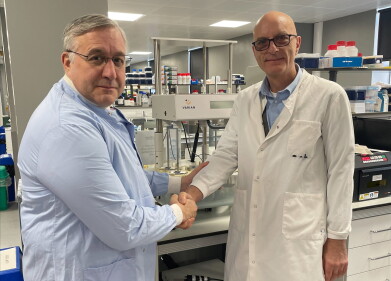-
 Professor Andrew Sewel,l Cardiff University School of Medicine
Professor Andrew Sewel,l Cardiff University School of Medicine -
 Professor Andrew Sewell with Research Fellow Garry Dolton
Professor Andrew Sewell with Research Fellow Garry Dolton
News
Discovery raises Prospect of Universal Cancer Therapy
Feb 12 2020
The use of T-cell therapies for cancer - where immune cells are removed, modified and returned to the patient’s blood to seek and destroy cancer cells – includes the use of CAR-T treatments which are personalised to each patient; however, this is said to target only a few types of cancers and has not been successful for solid tumours, which make up the vast majority of cancers.
Researchers at Cardiff University have now discovered T-cells equipped with a new type of T-cell receptor (TCR) which identifies and kills most human cancer types.
Conventional T-cells can recognise small parts of cellular proteins bound to cell-surface molecules called human leukocyte antigen (HLA), allowing killer T-cells to see what’s occurring inside the cells by scanning their surface. HLA varies widely between individuals which has created barriers to creation of a T-cell-based treatment that can target most cancers in all people.
Now the findings of the Cardiff study(1) describe a unique TCR that can recognise many types of cancer via a single HLA-like molecule called MR1. Unlike HLA, MR1 does not vary in the human population - meaning it is a hugely attractive new target for immunotherapies.
T-cells equipped with the new TCR were shown, in the lab, to kill lung, skin, blood, colon, breast, bone, prostate, ovarian, kidney and cervical cancer cells, while ignoring healthy cells.
Professor Andrew Sewell, lead author of the study and an expert in T-cells from Cardiff University’s School of Medicine, said: “Cancer-targeting via MR1-restricted T-cells is an exciting new frontier - it raises the prospect of a ‘one-size-fits-all’ cancer treatment; a single type of T-cell that could be capable of destroying many different types of cancers across the population. Previously nobody believed this could be possible.”
Experiments are under way to determine the precise molecular mechanism by which the new TCR distinguishes between healthy cells and cancer. The researchers believe it may work by sensing changes in cellular metabolism which causes different metabolic intermediates to be presented at the cancer cell surface by MR1.
The Cardiff group hope to trial this new approach in patients towards the end of this year following further safety testing. Professor Sewell said a vital aspect of this ongoing safety testing was to further ensure killer T-cells modified with the new TCR recognise cancer cells only.
"There are plenty of hurdles to overcome; however if this testing is successful, then I would hope this new treatment could be in use in patients in a few years’ time,” he said.
Further information at www.cardiff.ac.uk
Digital Edition
Lab Asia 32.2 April
April 2025
Chromatography Articles - Effects of small deviations in flow rate on GPC/SEC results Mass Spectrometry & Spectroscopy Articles - Waiting for the present to catch up to the future: A bette...
View all digital editions
Events
Apr 22 2025 Hammamet, Tunisia
Apr 22 2025 Kintex, South Korea
Analytica Anacon India & IndiaLabExpo
Apr 23 2025 Mumbai, India
Apr 23 2025 Moscow, Russia
Apr 24 2025 Istanbul, Turkey




















